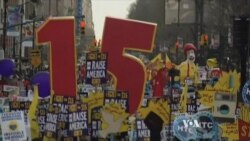Los Angeles is about to become the largest American city to raise its minimum wage to $15 an hour, an increase to be phased in over five years. The wage is more than twice the current minimum rate required by U.S. law, and its approval will be the latest victory in a national drive by labor unions and low-income workers.
Some business groups, however, say such increases will cost jobs.
Protesters demanding a higher minimum wage have been rallying around the country, from New York to Phoenix. Minimum-wage workers went to Los Angeles City Hall last week as council members considered the wage increase. It was given preliminary approval Wednesday and is expected to pass a final vote June 10.
The measure will raise the minimum wage in increments starting next year, to reach $15 an hour by 2020. Workers for small businesses and nonprofit organizations will reach the $15 mark the following year.
McDonald's worker Edgar Gonzalez, a young father, said it would make a difference.
"It will mean a lot," he said. "It will help me out with rent. It will help me out with diapers. It will help me out with having a better life.”
Former Wal-Mart worker Evelyn Cruz said the new wage would keep her from having to make unreasonable choices, such as "if I am going to pay for the roof over my head or food on the table.”
The U.S. Chamber of Commerce and some other business groups said that the measure would put an unfair burden on small businesses and that revising taxes would be a better way to help the poor. But the Los Angeles County Federation of Labor, a trade union coalition, said the measure would boost the economy and help workers.
Federation official Rusty Hicks said U.S. cities are stepping in where the federal government has not. “That is why you are seeing L.A., San Francisco, Oakland, New York and others step forward and try to address this issue on their own,” he said.
Business analyst Shon Hiatt of the University of Southern California said companies like McDonald's face stiff competition and slumping sales, and are starting to cut costs, and potentially cut jobs, through automation.
“McDonald's and other fast-food restaurants are moving in this direction," he said. "You will see the emergence of these touchscreens where individuals can order their food without even having to talk with an employee.”
The drive to raise the minimum wage is spreading. Laphonza Butler of the Service Employees International Union said the goal of $15 an hour might be tailored to local economies and be lower in some cities and higher in others.
“The number is an aspiration and a symbol as much as anything," Butler said. "The real goal here is to shift the values of our country back to rewarding hard work.”
As workers savor their victory in Los Angeles, they say the drive to raise the minimum wage across the United States has gained momentum.





